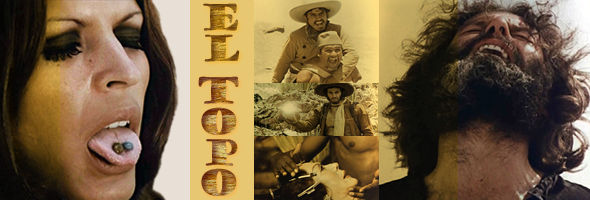
Color, 1970, 119m. / Directed by Alejandro Jodorowsky / Starring Alejandro Jodorowsky, Mara Lorenzio / Raro Video (Italy R0 PAL)
Clad in black leather, self-absorbed loner El Topo (Jodorowsky) rides into the desert with his naked son, Brontis, ordering him to bury his toys and a portrait of his mother so that he may become a man. Afterwards they encounter the slain residents of a nearby village, inspiring El Topo to hunt down and kill the perpetrator, the Colonel. El Topo ditches his little boy to ride
Despite the hordes of peculiar characters on display, El Topo is Jodorowsky's show all the way. Apart from acting, directing, and writing this opus, he served as production designer and composed the evocative, Morricone-inspired score, which was even given a deluxe vinyl release from Klein's Apple Records. The film isn't really so different from Jodorowsky's previous film, Fando and Lis, but the addition of color brings an increased sense of immediacy by contrasting the profuse, ultra-red blood with the vivid blues in the skies. Obviously the disconnected narrative and parade of surrealistic imagery will prove tough going for cult movie newcomers, but for those interesting in checking out Jodorowsky's work,
The Italian DVD transfer of El Topo will seem problematic for a number of reasons, especially compared to the previous Japanese sources. Colors are less vivid but detail is sharper; unfortunately this also enhances some of the print damage visible in numerous scenes. Thankfully the Italian disc has two large factors in its favor: the original Spanish-language soundtrack (with optional subtitles in English or Italian) and the absence of those fuzzy Japanese censorship blobs which blocked out the frontal nudity. The disc presentation is similar to that of Raro's The Holy Mountain, with text-related Jodorowsky supplements including a filmography, reviews for the film (including an amusing mixed response from Vincent Canby), and an academic discussion by Massimo Monteleone which focuses on the origins of the film and its symbolic references. Too bad the striking U.S. trailer will probably remain in limbo until an American DVD comes to pass, which could take longer than El Topo's decades underground with the freaks.
Color, 1973, 114 mins. / Directed by Alejandro Jodorowsky / Starring Alejandro Jodorowsky, Zamira Saunders, Juan Ferrara / Cinematography by Rafael Corkidi / Raro Video (Italy R0 PAL) WS (2.35:1)
The success of El Topo encouraged its producer, Apple Record's Allen Klein, to finance a far more ambitious follow up feature. Lensed in gorgeous Cinemascope and featuring a far more luxurious wealth of locations and sets, The Holy Mountain goes far beyond the metaphysical spaghetti western theatrics of its predecessor, offering itself a barrage of startling imagery and a tantalizing discourse melding every major religion in the world. Awakening from a comatose sleep and covered in insects, a bearded thief (Horácio Salinas) wanders into a town populated by freaks, fascists, hookers, and religious fanatics, where skinned, crucified livestock are paraded down the street, costumed frogs bloodily reenact the Spanish invasion of South America, and soldiers rape peasant women for the photographic amusement of tourists. Our hero is then used as a body mold to create hundreds of kitschy Christ statues, after which he returns to the street and, courtesy of a handful of balloons, ascends to a secret tower. In this isolated realm he encounters an alchemist (Jodorowsky), who demonstrates his knowledge by transforming the thief's excrement into crystals and gold. The alchemist then leads him to a chamber containing the naked, shaved bodies of six wealthy people of learning, all of them preparing for the next step in their spiritual awakening. One by one we learn their stories, ranging from a sexually bent bedmaker to a craftsman of pop culture religious weaponry. Led by the Alchemist, these nine souls in total then ascend "the holy mountain" where, they believe, nine wise masters reside and must be replaced. Along the way they encounter more sights, including a chicken massacre and an old man who shoots tiger breastmilk.
With its interjection of deliberate humor and mixture of abstract and modern urban settings, The Holy Mountain is a markedly different animal from El Topo. Here Jodorowsky seems to assimilating the quirks of Fellini, Bunuel, and especially Dusan Makavejev, tossing them together with a number of holy texts for one deeply mindbending cinematic stew. (Fellini would later crib The Holy Mountain's jokey metaphysical ending for And the Ship Sails On, though one could argue both men were more than a little inspired by Mario Bava's Black Sabbath.) The plaintive Morricone-on-acid score of El Topo here gives way to a tantalizing aural mixture of religious
Since it wasn't the midnight cult hit Klein was evidently aiming for, The Holy Mountain languished in obscurity for years before turning up on Japanese laserdisc from Nikkatsu. The letterboxed image was good for its time and the soundtrack preserved the original (heavily accented) English language dialogue, but optical censorship of the abundant full frontal nudity ruined more than a few sequences. A subsequent reissue by Amuse on laserdisc (with a dramatically inferior cover) was little better, while a PAL VHS release in the UK B&W, 1967, 96m. / Directed by Alejandro Jodorowsky / Starring Tamara Garina, Sergio Kleiner, Diana Mariscal, Maria Teresa Rivas / Fantoma (US R0 NTSC) / WS (1.66:1)
Designed like a confrontational road movie, Fando and Lis begins with the two title characters embarking on a quest to find the mythical city of Tar, a kind of utopia Fando's father used to speak about years ago. Though crippled, Lis has no problem with the trip as long as Fando carries or pushes her through the rough terrain. Along the way they encounter a number of bizarre sights, including a group of orgiastic mud wallowers, blood-sipping vampires, transvestites, and amateur musicians. Fando and Lis also undergo some internal changes of their own, including a memorably body painting session that spins wildly out of control and a climactic scene involving pigs that will leave most viewers gasping with disbelief. (Pasolini, however, would have been proud.)
Jodorowsky shot the entirety of the film on spare weekends, following a one page draft based upon the Fernando Arrabal play which he and his trouple had been performing for several months. Not surprisingly, the results confounded most critics, and the explicitness of its imagery (particularly for '67) didn't exactly please the censors, either. Jodorowsky claims that all of the violence and blood in the film was real (apparently including - shudder - the vampire scene), a trend he later continued by raping his co-star on camera in El Topo. (Oddly, the actress in question has never really spoken out about her reactions to this scene.) Fando is most definitely a product of its time, revealing influences of filmmakers like Bunuel, but also contains some interesting precursors of later early '70s films. Most obviously, Michelangelo Antonioni's Zabriskie Point, filmed in 1970, mirrors Fando in a number of eerie respects, ranging from the aforementioned orgy (very similar to Zabriskie's desert couplings) to the entire concept of a disconnected young couple embarking on an anti-establishment voyage of self-discovery through the desert. Seen over thirty years later, Fando and Lis will strike viewers as either a magnificent metaphysical journey or a load of quasi-mystical baloney, depending on one's point of view; in either case, it's a fascinating work and definitely worthy of preservation.
The DVD itself carries a steep price tag but more than delivers. Taken from the original negative, the transfer looks fantastic with only some very minor occasional blemishes on the emulsion. Some of the brighter sunlit scenes have a slight strobing quality which may have been a flaw with the original film, but the contrast and depth of detail are extremely satisfying. Accurately framed at 1.66:1, the film is presented in Spanish with optional English subtitles; more astonishingly, Jodorowsky's dense, multi-layered commentary track in English is also presented with optional subtitles, due to his thick accent.
The film itself is only the beginning, though. The DVD also contains the complete 87 minute subtitled version of The Jodorowsky Constellation (Le Constellation Jodowsky), a 1995 documentary for French television most widely circulated in a truncated one hour edition. While reading about Jodorowsky can be unnerving (he's "talented to the point of madness," as the documentary puts it), on film he actually seems personable and witty, a far cry from his brutal El Topo persona years ago. The documentary covers every imaginable aspect of his career, beginning with his education in mime (Marcel Marceau appears to share a few anecdotes), his creation of the "Panique" anti-surrealist theatrical movement, his successful comic book career, and most thoroughly, his current "psychomagic" seminar presentations. The films also receive a huge amount of attention; completists will be happy to see letterboxed, uncensored clips from both El Topo and The Holy Mountain, while Peter Gabriel appears to discuss his encounters with Jodorowsky and the profound influence El Topo had upon his music. Best of all, Jodorowsky provides a look at the original sketches and storyboards for his elaborate, unproduced version of Dune, later picked up by David Lynch. He also discusses the "failure" behind such completed projects as Tusk and The Rainbow Thief while spinning out a few diverting stories along the way. A very illuminating (so to speak) and worthwhile film, this is an ideal companion piece.
Rivers of blood, gunfights, philosophy-spewing freaks, gay banditos with a shoe fetish, passive-aggressive prostitutes, and sandy tableaux of human and animal carcasses populate the world's greatest spiritual western. Still holding its place in history books as the first acknowledged "midnight movie," Alejandro Jodorowsky's El Topo (translation: "The Mole") virtually passed into oblivion thanks to the efforts of its American rights owner, '60s rock guru Allen Klein, to keep it off
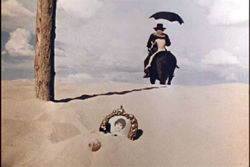 the market following a violent dispute with the notoriously eccentric director. Fortunately Japanese home video and the ensuing gray market kept its reputation alive, with new generations of viewers discovering its crackpot charms and passing word of mouth on to friends. One can only imagine its impact in 1970, when 2001: A Space Odyssey and Fantasia had brought head culture cinema into the mainstream; El Topo extends beyond these studio efforts and drags the viewer's consciousness on a whirling rollercoaster ride of violence, religious theory, and stunning imagery that only coalesces together in the realm of dreams.
the market following a violent dispute with the notoriously eccentric director. Fortunately Japanese home video and the ensuing gray market kept its reputation alive, with new generations of viewers discovering its crackpot charms and passing word of mouth on to friends. One can only imagine its impact in 1970, when 2001: A Space Odyssey and Fantasia had brought head culture cinema into the mainstream; El Topo extends beyond these studio efforts and drags the viewer's consciousness on a whirling rollercoaster ride of violence, religious theory, and stunning imagery that only coalesces together in the realm of dreams.
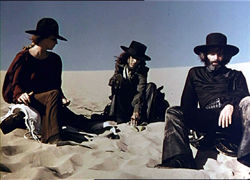 off with the Colonel's woman, Mara Lorenzio, who encourages him to wipe out the Four Masters who control this forbidding territory. One by one he encounters the Masters, who demonstrate different abilities and philosophical viewpoints before their showdowns. At this point the film takes a bizarre, pre-Mulholland Drive plot turn involving a time jump, subterranean freaks, and the grown Brontis, leading to an appropriately grim and transcendent finale.
off with the Colonel's woman, Mara Lorenzio, who encourages him to wipe out the Four Masters who control this forbidding territory. One by one he encounters the Masters, who demonstrate different abilities and philosophical viewpoints before their showdowns. At this point the film takes a bizarre, pre-Mulholland Drive plot turn involving a time jump, subterranean freaks, and the grown Brontis, leading to an appropriately grim and transcendent finale.
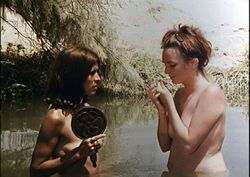 this is a solid place to start along with his more linear Santa Sangre.
this is a solid place to start along with his more linear Santa Sangre.
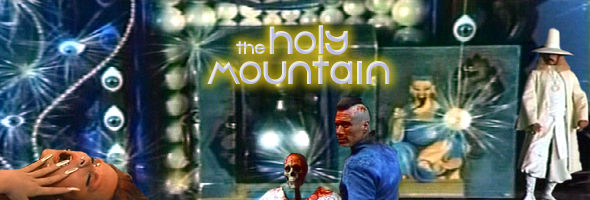
Outrageous. Shocking. Insane. For years these words have been applied to many directors, but none more so than Alejandro Jodorowsky. A mercurial talent who turns up with a film every seven or eight years, he first came to prominence around the world with El Topo, the first genuine midnight movie, in which the director also appeared onscreen as a gunfighter clad in black leather embarking on a mystical journey through the desert.
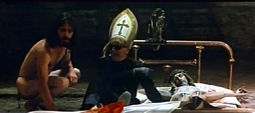
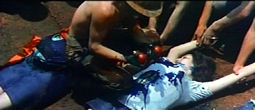 instrumentation and funky pop compositions, while Jodorowsky's first time out in scope results in some of the most remarkable images of his career. Obviously not a film for everyone, but the synopsis alone should tell you that.
instrumentation and funky pop compositions, while Jodorowsky's first time out in scope results in some of the most remarkable images of his career. Obviously not a film for everyone, but the synopsis alone should tell you that.
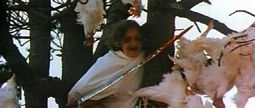 offered a somewhat fuzzier transfer with the same annoying censor blobs. Despite Klein's apparent intention to keep both of his Jodorowsky films buried, The Holy Mountain resurfaced again on Italian DVD. Overall this is a passable if unexceptional transfer, fully letterboxed and uncensored. The print looks a bit soft and worn in spots, and while colors are rich and accurate for the most part, a few sequences display some muddiness and bleaching, with a tendency to turn brownish. The English track is accessible with optional Italian subtitles, though the disc defaults to an Italian dubbed track. Oddly, the theatrical trailer from the Japanese releases is not included, but the disc does contain a subtitled interview with Italian Jodorowsky scholar Massimo Monteleone, as well as a bilingual Jodorowsky filmography and biography and amusing critical anthology contained in the fairly thick insert booklet. (Amusingly, the back sleeve notes this is "presented in a letterbox widescreen format preserving the 2.35:1 aspect ratio of the original theatrical exhibition. Enhanced for 4:3 widescreen Tvs" [sic].) On a more controversial note, the disc also represents a reedited Italian cut of the film, with fleeting trims made to a number of incidental shots (including the castration sequence) for no discernible reason, often amounting to a few frames.
offered a somewhat fuzzier transfer with the same annoying censor blobs. Despite Klein's apparent intention to keep both of his Jodorowsky films buried, The Holy Mountain resurfaced again on Italian DVD. Overall this is a passable if unexceptional transfer, fully letterboxed and uncensored. The print looks a bit soft and worn in spots, and while colors are rich and accurate for the most part, a few sequences display some muddiness and bleaching, with a tendency to turn brownish. The English track is accessible with optional Italian subtitles, though the disc defaults to an Italian dubbed track. Oddly, the theatrical trailer from the Japanese releases is not included, but the disc does contain a subtitled interview with Italian Jodorowsky scholar Massimo Monteleone, as well as a bilingual Jodorowsky filmography and biography and amusing critical anthology contained in the fairly thick insert booklet. (Amusingly, the back sleeve notes this is "presented in a letterbox widescreen format preserving the 2.35:1 aspect ratio of the original theatrical exhibition. Enhanced for 4:3 widescreen Tvs" [sic].) On a more controversial note, the disc also represents a reedited Italian cut of the film, with fleeting trims made to a number of incidental shots (including the castration sequence) for no discernible reason, often amounting to a few frames.
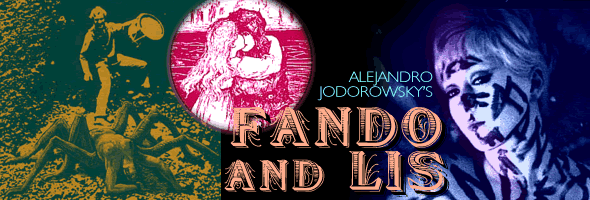
Thanks to DVD, Jodorowsky fans can sample the earliest surviving example of his work with Fando and Lis, his first real feature (not counting a filmed mime project called The Severed Head), which was buried after its release following a stormy reception at the Acapulco Film Festival and its subsequent disposal by international distributor Cannon Films. The inaugural DVD effort from eclectic label Fantoma, this was one of the earliest and most significant cult releases in the format's history.
